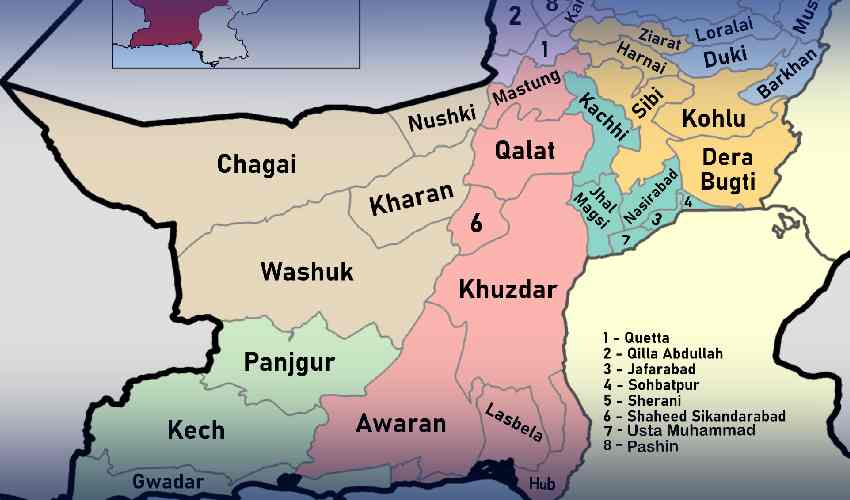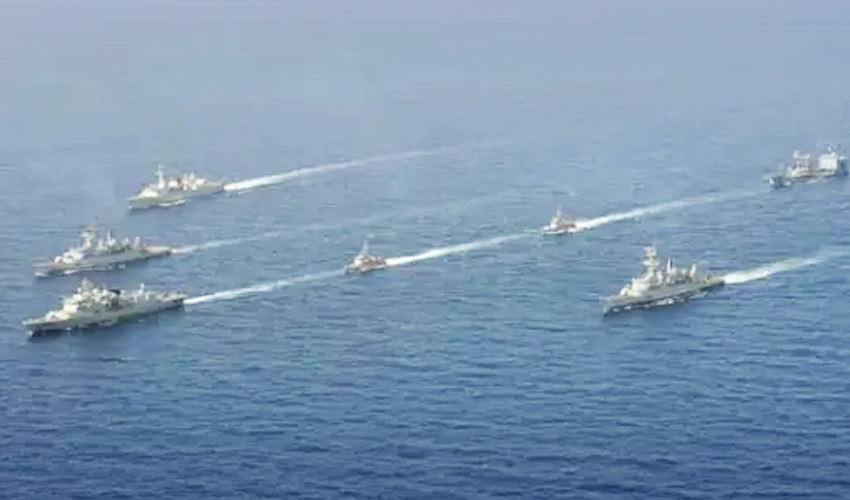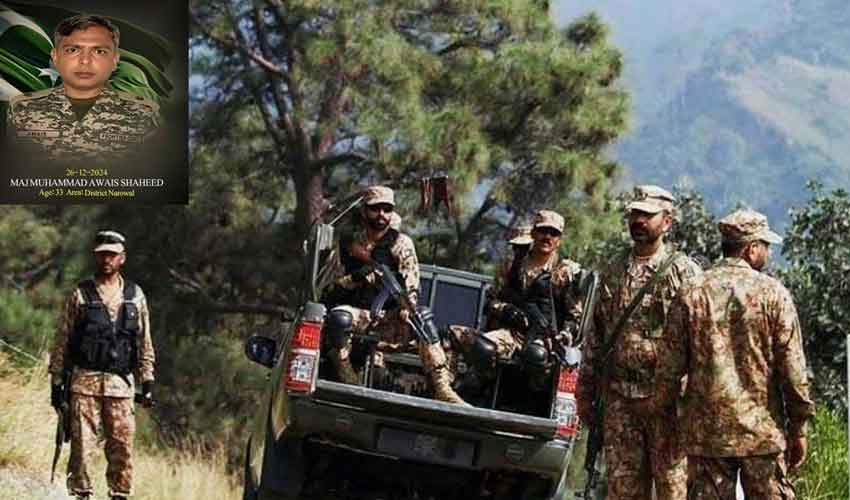As per Census 2023, the population of Pakistan stands at approximately 242 million which is distributed across four primary provinces. Punjab, the most populous province, accounts for a significant portion of the total population, with approximately 127.68 million residents, followed by Sindh, home to around 55.69 million people.
The province of Khyber Pakhtunkhwa (KP) ranks third in population, with an estimated 40.856 million inhabitants. Balochistan has the smallest population of the four provinces, with approximately 12 million residents.
This province is noted for its diverse ethnic groups and significant natural resources; its population density is relatively low compared to the other provinces. It is pertinent to mention that the aforementioned figures do not account for the populations of the Islamabad Capital Territory, Gilgit-Baltistan (GB), and Azad Jammu and Kashmir (AJK), which collectively host additional millions of individuals.
In Balochistan demographic composition of a population encompasses a diverse array of ethnic groups. Among these groups, a significant portion consists of Pashtoon individuals, followed by the Brahvi community, Hazara people and settlers from other parts of the country. While the Baloch people represent a significant and influential segment, the presence of these other ethnic groups illustrates a broader social tapestry, highlighting the multicultural nature of the population in Balochistan.
Other than Balochistan, a considerable number of Baloch people have settled in various provinces and major urban centers across Pakistan. Significant Baloch communities are found in Punjab and Sindh. Furthermore, Karachi, the largest city in Pakistan and a bustling economic hub, hosts a vibrant population of Baloch people who contribute to the city's dynamic workforce. Islamabad, the capital city of Pakistan, also has a notable number of Baloch residents, reflecting the demographic diversity that characterizes the city.
The migration of Baloch individuals to these regions is often driven by various factors, including economic opportunities, educational pursuits, and a desire for improved living conditions. This migration has led to the establishment of significant Baloch cultural influences in these areas, contributing to the rich amalgam of Pakistan's social and cultural fabric.
Through their presence in Punjab, Sindh, Karachi, and Islamabad, the Baloch people continue to play an important role in the national narrative, ensuring that their unique heritage and traditions are inter woven with the broader Pakistani identity.
Besides Pakistan, considerable population of Baloch people live inside Iranian territory along the approximately 909 kilometers extended border. Within the context of Iran, the Baloch constitute a minority group, making up a small fraction of the overall demographic landscape of the country. Despite their historical and cultural distinctiveness, the prospect of these Baloch people achieving independence is practically non-existent. Various geopolitical, social, and economic factors contribute to this situation, rendering autonomy or independence an unrealistic aspiration for this community within the existing framework of the Iranian state. The complex dynamics of nationhood, regional politics, and minority rights further complicate the Baloch's position; underscoring the challenges, they face in seeking greater recognition or autonomy in a nation where they remain a marginalized group.
The notion of a distinct and separate Balochistan is fundamentally a farce, a narrative constructed and perpetuated by inimical elements who are fully aware of its implausibility. This is substantiated by the reality that geopolitical and social realities surrounding the region render an independent Balochistan untenable. The propaganda advocating a separate Balochistan, is therefore a superficial and with vested interest.
The province possesses significant potential that can be harnessed for both regional and national development. This potential is reflected in various aspects, each contributing uniquely to the overarching promise of the region.
Firstly, the Province is strategically located, serving as a gateway to several vital trade routes that connect South Asia, Central Asia, and the Middle East. Its geographical position allows for the establishment of transportation networks that can facilitate trade and commerce, enhancing economic activities not only within the province but also across neighboring regions. The development of roads, railways, and ports is essential in improving access and mobility, making Balochistan an attractive location for investment and trade partnerships.
Secondly, Balochistan is rich in mineral resources, which presents an exceptional opportunity for economic growth. The province is endowed with a diverse array of minerals, including copper, gold, coal, and various industrial minerals. The extraction and processing of these resources can significantly boost the local economy, create job opportunities, and attract foreign investments. The responsible and sustainable management of these mineral resources is paramount to ensuring long-term economic benefits while minimizing environmental impacts.
Additionally, Balochistan boasts fertile land in certain areas, which has the potential to support robust agricultural activities. The fertile plains and favorable climate conditions enable the cultivation of various crops, including fruits, vegetables, and grains. Promoting agricultural development through modern farming techniques and irrigation projects can enhance food security, increase incomes for local farmers, and contribute to overall economic stability in the region.
Furthermore, the province's access to Bluewater Resources opens avenues for maritime activities, including fishing and shipping. The coastline of Balochistan, which stretches along the Arabian Sea, is rich in marine life and provides opportunities for sustainable fishing practices. Additionally, the development of ports and harbor facilities can transform Balochistan into a crucial trade hub, facilitating international shipping and commerce. This aspect of connectivity can lead to increased economic activity and the generation of employment opportunities.
Lastly, the hardworking and resilient people of Balochistan are an invaluable asset to the province's development potential. The local population possesses a strong work ethic and a deep-rooted cultural heritage that fosters a sense of community and collaboration. By investing in education, vocational training, and skill development programs, the potential of the workforce can be further enhanced. Empowering the people of Balochistan through capacity-building initiatives will enable them to actively participate in the province's economic progress, driving innovation and enhancing productivity across various sectors.
Adverse and antagonistic forces recognize and understand the potential that Balochistan possesses to significantly enhance and uplift the socio-economic landscape of Pakistan. This strategically important region, rich in natural resources, has the capacity to contribute to the national economy in numerous ways. Its vast mineral wealth, expansive land for agriculture, and proximity to trade routes position Balochistan as a vital asset for fostering economic growth and development. However, these inimical elements are aware that such advancements could lead to a stronger and more unified Pakistan, potentially undermining their own interests. They perceive the empowerment and enhancement of Balochistan as a direct threat to their agendas, prompting them to engage in activities that seek to destabilize the region. The implications of this dynamic are profound, as the prosperity of Balochistan could lead to increased employment opportunities, improved infrastructure, and enhanced social services for its residents, thereby contributing to national stability and growth. The recognition of Balochistan's ability to transform the economic fabric of Pakistan by both internal and external actors warrants a careful examination of the underlying factors that perpetuate the region's challenges.
Terrorist organizations have been strategically assigned the nefarious objective of halting progress in in the region. By employing violent tactics and instigating chaos, these groups aim to undermine the foundational structures that facilitate progress and development. The impact of their actions is multifaceted; they not only create immediate disruption through attacks but also incite long-term psychological effects that can paralyze communities, hinder economic growth, and diminish trust in institutions. Such strategies serve to regress societal evolution, as the uncertainty and fear propagated by these organizations can lead to reactive measures by the people that may further impede forward momentum. Furthermore, these terrorist entities exploits social, political, and economic grievances to amplify their influence and to recruit individuals who feel disillusioned or marginalized.
The Baloch Liberation Army (BLA), Baloch Republican Army (BRA) and various other Baloch Sub-nationalist Groups have been known to actively target developmental initiatives within the region. This includes a broad range of activities, such as the intimidation or direct assault of workers engaged in these projects, attacks on construction camps, and the destruction or sabotage of machinery and equipment utilized for development purposes. The motivations behind these actions are rooted in the broader context of political and social grievances held by these groups, which often stem from a perceived neglect or exploitation of Baloch resources and a lack of adequate representation in governmental processes. By undermining developmental work, these factions aim to draw attention to their cause and assert their demands for greater autonomy. Such tactics not only hinder the progress of essential infrastructure and economic development in the region but also contribute to an atmosphere of instability and insecurity, further complicating efforts to foster a collaborative and constructive environment for growth and development in Balochistan. The ongoing conflict significantly impacts the capacity of the government and private entities to implement development projects effectively, thereby exacerbating the socio-economic challenges faced by the local population.
The security risk associated with such circumstances is significantly heightened, leading to profound implications for various stakeholders involved in project execution. As the perception of increased risk permeates the environment, the financial implications become increasingly burdensome, with the cost of projects escalating by a factor of three to four times the original estimates. This inflation in project costs not only strains budgetary allocations but also complicates financial planning and resource management for organizations. Moreover, the heightened security concerns serve as a deterrent for foreign investors and international partners who may have otherwise considered engaging in business ventures within the affected region. The prospect of potential security threats leads to a reluctance among these entities to commit their resources and capital, thereby stifling opportunities for collaboration and growth. Consequently, this reluctance on the part of foreigners can result in a diminished influx of foreign direct investment (FDI), which is often crucial for economic development and innovation. The overall effect of these compounded issues creates a challenging environment for both local and international stakeholders.
Furthermore, the act of targeting or assaulting security forces by these organizations serves to intensify and amplify the pervasive sentiment of insecurity within the society. When individuals or groups engage in violent confrontations with those sworn to protect and uphold public safety, this not only undermines the authority of law enforcement agencies but also instills a profound sense of fear among the general populace. The perception of safety is fundamentally altered, as citizens may begin to question the effectiveness and reliability of security forces tasked with maintaining order. Such incidents can lead to a breakdown of trust between the community and the institutions designed to safeguard its members, creating an atmosphere where anxiety and vulnerability thrive. The ramifications extend beyond immediate physical threats; the psychological impact can create a lasting impression on individuals, fostering a climate where the potential for violence is ever-present. The continuous cycle of aggression against security personnel ultimately contributes to a broader societal instability that can have far-reaching consequences.
The narrative surrounding the concept of 'Ehsaas - e - Mehroomi' is emphasized and manipulated to influence public perception. Those who engage with this narrative are acutely aware that the separatist perspective, which attempts to frame societal and political issues through the lens of perceived exclusion, is fundamentally flawed. They recognize that this approach lacks the capacity to effectively address the complexities of the situation at hand and also is incapable of garnering widespread support. Consequently, the reliance on narratives centered around deprivation is seen as misguided, as it fails to resonate with broader audiences and does not provide viable solutions to the problems being discussed.
Balochistan, represents a multifaceted political landscape where various national political parties, such as Pakistan People’s Party (PPP), Pakistan Muslim League-Nawaz (PML-N), Pakistan Muslim League-Quaid (PML-Q) and Jamiat Ulema-e-Islam (JUI), play significant roles. Each of these parties has established its presence and influence within the province, contributing to the broader political discourse of the region. Balochistan is thus not isolated but intricately woven into the fabric of the national political process. Members of these and various local parties from Balochistan have not only participated in provincial governance but have also ascended to critical positions at the national level, including roles such as Prime Minister (Mir Zafarullah Khan Jamali), Chairman of the Senate (Sadiq Sanjrani) and Deputy Speaker of the National Assembly (Qasim Suri). Their participation in these high offices underscores the importance of Balochistan's political leadership within the framework of Pakistan's governance.
This involvement not only strengthens the political representation of the province but also ensures that the unique concerns and interests of Balochistan are highlighted in national discussions. As such, the political dynamics of Balochistan contribute significantly to the overall political narrative of the country, reflecting a commitment to inclusion and representation across diverse political affiliations. It is also worth mentioning here that besides representation of Political Leadership from Balochistan in highest political offices, out of 17 Commanders of the Pakistan Army 2 were from Balochistan i.e. C-In-C General Muhammad Musa and COAS General Abdul Waheed Kakar.


























